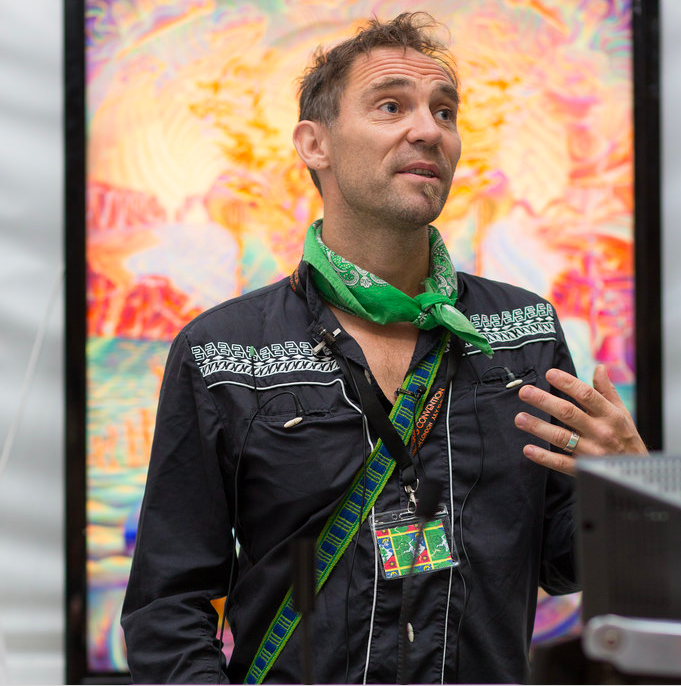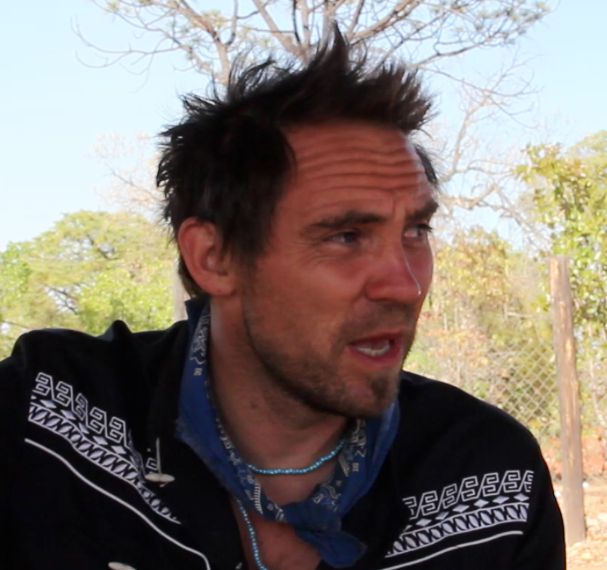Welcome to Afterglow, a newsletter that will change your mind. My name is Charles Bliss and I'm a psychedelic journalist from Norwich, UK.
This week I interviewed Dr David Luke about his upcoming talk at Epic Studios on the benefits, risks and politics of psychedelics. Take the trip.

After a 50-year hiatus, more research into the therapeutic potential of psychedelics is happening now than ever before. Studies are analysing the benefits of drugs such as lysergic acid diethylamide (LSD), dimethyltryptamine (DMT) and psilocybin mushrooms on mental health indices like anxiety, depression and addiction, which may be more promising for reducing symptoms than existing treatments.
An upcoming talk from Dr David Luke at Epic Studios in Norwich will offer a general introduction to the science and research around the psychedelic renaissance on 26 October 2022.

Dr Luke is Associate Professor of Psychology at the University of Greenwich, where his work focuses on transpersonal experiences and altered states. He is also co-founder and director of Breaking Convention, an educational charity that hosts an international conference on psychedelic consciousness.
"I'm a psychologist, so I'm interested in how psychedelics affect consciousness, behaviour and cognition," he says.
How do psychedelics work?
There are various mechanisms at work in the brain under the influence of psychedelics, such as reductions of activity in the default mode network (DMN) — a central hub that is loosely identified with the ego.
"When you reduce activity in the DMN, your brain becomes less constrained and increases the amount of connectivity between different regions," says Dr Luke. "We think this gives rise to creative insights and experiences like synaesthesia — a blending of the senses."
It is thought that reductions of activity in the frontal lobe could help in reducing depressive rumination, whereby people get stuck in limited circuits of negative thought.
"The psychedelic breaks those patterns."
Psychedelics also encourage neuroplasticity, which refers to the growth and development of new brain cells and synaptic connections.
"Neuroplasticity is thought to be very positive in laying down new neural pathways. This allows you to break addictive cycles, habitual thought patterns, depressive cycles and so on."
DMT
DMT is one of the most fascinating psychedelic substances because it is naturally occurring not just in nature but also in mammals including the human body. The DMT trip is also one of the most intense experiences available to the human sensorium. It only lasts for about 10 minutes, but these experiences are extremely profound.
This year, Dr Luke finished a DMT field research study and has also advised companies developing drugs with DMT and 5-Meo-DMT so they can better optimise benefits and reduce harms.
"The field research is a unique methodology that is more direct and natural because we're not administering drugs in a laboratory. When people are taking the drug, they invite us to come round to their house and we give them tasks to do, which we measure before, during and after.
"We're mapping the psychedelic experience with DMT in particular, looking at psychological variables like the person's underlying cognitive style, prior beliefs, the experience itself — how deep and profound it is — and also what kinds of phenomena occur."

Dr Luke has published widely on DMT including his book DMT: Entity Encounters. A recent survey found that people tend to have encounters with benign but hyper-intelligent beings when they have high doses of DMT.
"The researchers found that those people who were atheist before a DMT experience in which they had an encounter with these beings, less than half of them remained atheist afterwards. This is astonishing – an experience that can convert more than half of all atheists in 10 minutes."
DMT may also have neuroprotective qualities against strokes, according to recent research on rats. DMT administered within close succession of a stroke could reduce brain damage.
"It could be that in the future paramedics will have DMT on crash trolleys for when people have a stroke."
What are the risks?
Risk-benefit analyses show that psychedelics are low on risks and potentially high on benefits.
"The physiological risks and side effects with DMT, LSD and psilocybin are very low," Dr Luke says. "Psychedelics are relatively non-toxic. There's no record of death by overdose, for instance, even taking extremely large doses."
Although the classic psychedelics are popular, they are generally considered to be non-addictive.
"Most DMT users don't do it habitually. In fact, it's such an intense experience that they do it very, very rarely."
But there are potential risks with any medicine — and with psychedelics these tend to be psychological. Users may not necessarily be prepared or suited to the experience and might struggle to integrate the psychological material that arises.
"We often hear stories of recreational users having difficult experiences and ending up in A&E or triggering psychosis," Dr Luke says. "In clinical settings, those outcomes are less common because there is a period of preparation and people are screened to make sure they don't have any risk of psychosis.
"They have a sitter and a period of integration with the therapist as well, so the risks are minimised through the context of use. In those cases, we generally don't see adverse psychological experiences. The majority of people will usually have a very positive experience along with reductions in their clinical symptoms."
In this context, people often have a mystical experience during psychedelic therapy, which is strongly related to positive clinical outcomes.
"These are very intense positive changes in mood, perceptions of time and space, connection to themselves and the universe. The more intense mystical experiences people have, the more likely they are to reduce anxiety, depressive symptoms or addictive cravings."
The mystical experience is also strongly linked with insight.
"People come to some understanding of why they are depressed or addicted," says Dr Luke. "They have this moment of clarity about what they need to do."
Why are psychedelics illegal?
The Misuse of Drugs Regulations 2001 classifies psychedelics like LSD, psilocybin and DMT as Schedule One drugs, which means they are thought to have no therapeutic or medical value and a high risk of abuse. But Dr Luke disagrees.
"There isn't actually any good scientific basis for psychedelics to fall under that particular classification because they do have potential medical benefits and they are not high in abuse potential. It's an artefact of the political climate in the 1960s and 1970s.
"The ironic thing about DMT is that we all possess DMT because our bodies make it," Dr Luke says. "Effectively everyone is a criminal, which is somewhat ridiculous."
While there are calls for decriminalisation or legalisation, the main priority for drug reformers is to update the schedule to facilitate more in-depth studies. The legal status presents a Catch 22: without updating the law to make it easier to conduct research, how can we prove the medical benefits of psychedelics with robust science?
"At the very least, we could make it easier to do research and see the medical potential. We are starting to see the first inklings of legislative change and I think we just need to continue to lobby the government and increase education."
Psychedelic politics
Last year, a YouGov poll found that the majority of people in the UK were in favour of discussing drug policy reform around psilocybin as a medicine.
"UK politicians need to understand that drug policy reform is no longer a vote loser," Dr Luke says.
All the major political parties have a drug policy reform group and, surprisingly, the Conservative Drug Policy Reform Group is the most active. There is significant lobbying from Crispin Blunt MP, who approached former Prime Minister Boris Johnson in November 2021 about reviewing the legislation around psilocybin for medical research.
But the War on Drugs has not stopped underground therapists from providing illegal psychedelic retreats such as ayahuasca medicine circles. Dr Luke is not sure that law enforcement agencies consider them a high priority.
"Police forces understand the nature of criminal priorities and these are very much a low-priority crime."
This is a good example of the difference between de jure law, which is the written law stating a technically illegal activity, and de facto law, which refers to a state of affairs that is true in fact, but that is not officially sanctioned.
"People are putting their liberty and livelihood at risk by doing this — and yet lots of people still do it," Dr Luke says. "But it's not like a model of drug use whereby people are secretively addicted and have to get their fix.
"People who have had their own experiences recognise the massive potential of psychedelics for all manner of positive changes in wellbeing and personality. They want to share that with other people. It's a community-focused, pro-social activity for enhancing everyone's wellbeing."
Norwich Psychedelic Group will meet at the Artichoke on Magdalen Road before attending the talk. Buy tickets for the event here:

We hope to see you there!
Charles Bliss
🤯 Mind at Large
A breakdown of mind-blowing ideas I encountered this week:
📖 Book – This Timeless Moment (1968) by Laura Archera Huxley. The second wife of Aldous Huxley offers a moving and provocative account of the writer's final days, including his terminal trip and sacramental act, which saw Huxley exit the stage high on LSD in 1963.
🎵 Music – I'm heading to the London Palladium to see Bob Dylan tonight, so here's Things Have Changed, an Oscar-winning tune.
"I think everybody's mind should be bent once in a while."
Bob Dylan
🫠 Enjoying this newsletter?
Forward to a friend and let them know where they can subscribe.

